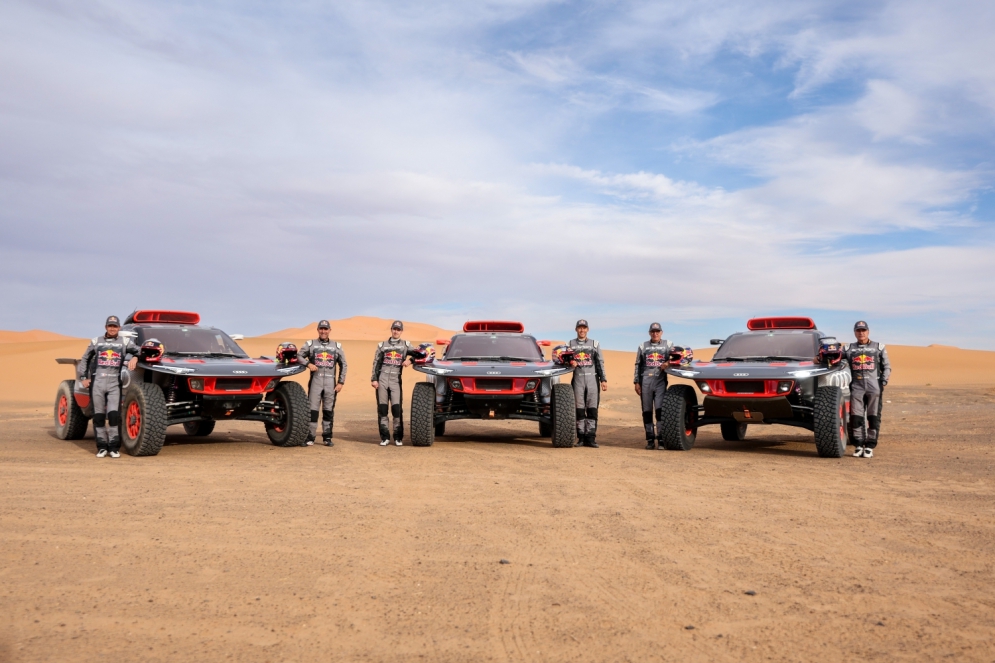Total distance of approximately 7,900 kilometers
The drivers, co-drivers, and management of Team Audi Sport agree: A particularly challenging edition of the Dakar Rally lies ahead of all participants. Twelve special stages during 14 days in Saudi Arabia cover 4,727 kilometers. Including all of the liaison stages, the route results in a total distance of 7,891 kilometers. The teams often have to complete more than 400 kilometers a day on the special stages. “That’s why it’s important not to lose your stamina during the rally,” emphasizes Stéphane Peterhansel. “I have trained a lot on my bicycle. We have to be able to rest well during the nights, and we also pay attention to our diet.” One of the special challenges this year is a 48-hour stage. It takes place on January 11 and 12 and forms a joint stage – the sixth of twelve. The organizers have chosen the Empty Quarter with its seemingly endless sea of dunes as the venue. As the motorcycles and quads are on different routes, the leading crews in the cars and racing trucks will not have any tracks in the sand on these two days. In addition, the participants have to do without the regular service from the team and are only allowed to help each other. That night, however, they are spread across multiple bivouacs. They are also unable to perceive and assess the performance of their opponents. “This will be a big strategic challenge,” says Peterhansel’s co-driver Edouard Boulanger. “But the second week will also be tough, because this year the rocky stages only come at the end. Then things can still change.”
Detailed development work on the Audi RS Q e-tron
The development team led by Dr. Leonardo Pascali has improved the RS Q e-tron in many areas compared to last year’s model. “The new set-up improves comfort and is also very efficient,” emphasizes Carlos Sainz, who has optimized many rally cars in his almost 40 years as a professional driver. Mattias Ekström adds: “For me, it’s all about how we use the car perfectly in the sand. It helps that we can drive over the dunes without needing to change gears.” Edouard Boulanger notes a shift in the emphasis of individual topics: “At the beginning of the project, the focus was on the fundamental development of the complex drivetrain technology and the car. In the meantime, we have also found the time to improve many aspects of the cockpit. We can better control the noise levels and the effects thereof, and the driver and co-driver are also better protected against the effects of hard impacts and extreme loads. The technicians have worked hard on this during the past year and made real progress. A big compliment for that.” The electric drivetrain of the RS Q e-tron with a high-voltage battery draws its power from an energy converter. Audi has been relying on residue-based reFuel for its operation since the last Dakar Rally. The regulations limit the output of the electric drivetrain to 286 kW in January 2024, distributed between the front and rear axles. Many other new details reduce maintenance times for the team and make the prototype safer, more reliable, and more comfortable.
Team Audi Sport is part of a strong field of entrants
343 participants have registered for the 46th edition of the Dakar Rally. They will start with 72 cars in the T1 and T2 classes, 42 additional models in the T3 class, 36 smaller SSV vehicles, 46 trucks, as well as 137 motorcycles and 10 quads. “We are up against very strong and experienced competitors,” Rolf Michl is sure. “As every year, we expect that the relative strengths of the competition will only really become apparent during the rally.” Carlos Sainz recognizes the strong competition: “Definitely Dakar winner Nasser Al-Attiyah and world rally champion Sébastien Loeb in the Prodrive Hunters are among them. Toyota also has a former winner in Giniel de Villiers and a number of good younger drivers in its line-up. And we certainly won’t underestimate our new opponent, Ford, with former winner Nani Roma.” For the third year in a row, Team Audi Sport is entering the event with its unchanged driver line-up. As a DTM champion, World Rallycross champion, 24-hour race winner, and champion of an electric touring car series, Mattias Ekström probably brings the greatest variety of experience and success to the table. “I’ve learned a lot since I first competed as a rookie in 2020,” says Ekström. “Our rivals are experienced and fast. I’ve been training and competing as much as possible in order to be ready. My co-driver and I have continued to increase our speed and our understanding of the sport.” His navigator is fellow Swede Emil Bergkvist, who has quickly adapted to the Dakar Rally. “I’m already looking forward to the next edition, because our learning curve continues to point upwards,” says the co-driver, who only switched from the driver’s to the co-driver’s seat since working with Mattias Ekström.
As a 14-time winner, Frenchman Stéphane Peterhansel is the lone record holder at the Dakar Rally. He relies on the guidance of his compatriot Edouard Boulanger, who has already accompanied him to victory. Two-time World Rally champion Carlos Sainz is a giant of his sport. He first drove with Lucas Cruz as his co-driver in 2009, and the two Spaniards have together won the Dakar Rally three times to date. They are the longest-standing driver and co-driver combination at Audi. “The upcoming Dakar will be tough, but we have prepared thoroughly for it,” says Lucas Cruz confidently. “Physically, my program included cycling and jogging in the mountains, plus exercising in the gym. Mentally, I prepare myself with a sports psychologist. This helps my reaction times and with multitasking.”
Coordinated team as a key strength
The foundation of such a complex, varied and high-stress environment as the Dakar Rally is a reliable team. Team Audi Sport has cooperated with Q Motorsport from Trebur, Germany since day one. Sven Quandt, who won the T1 Marathon Cup in cross-country rallying as a driver in 1998, has long been a successful team principal. He has already won the Dakar Rally six times with his X-raid team and the World Cup for cross-country rallies eleven times. “Experience is the key to success in our sport,” emphasizes Stéphane Peterhansel. “Sven Quandt and his team have shown that they can overcome all challenges. With such a good team behind us, we sleep more soundly at night and go into the stages with more confidence.” His co-driver Edouard Boulanger adds: “We have a lot of new members who have joined Team Audi Sport. They have done an excellent job in familiarizing themselves with the subject matter over this year and have driven the project forward in a good direction with their contributions. That gives me confidence.” Nevertheless, Mattias Ekström speaks for everyone when he says: “I have learned to remain humble in this sport. There are incredibly long days and so many of them ...”
With the combined experience of drivers, co-drivers, the entire team, and the further developed RS Q e-tron, Rolf Michl has one wish above all: “We want to experience the Dakar Rally as smoothly as possible to show what we can do.”
— Press release courtesy of Audi




